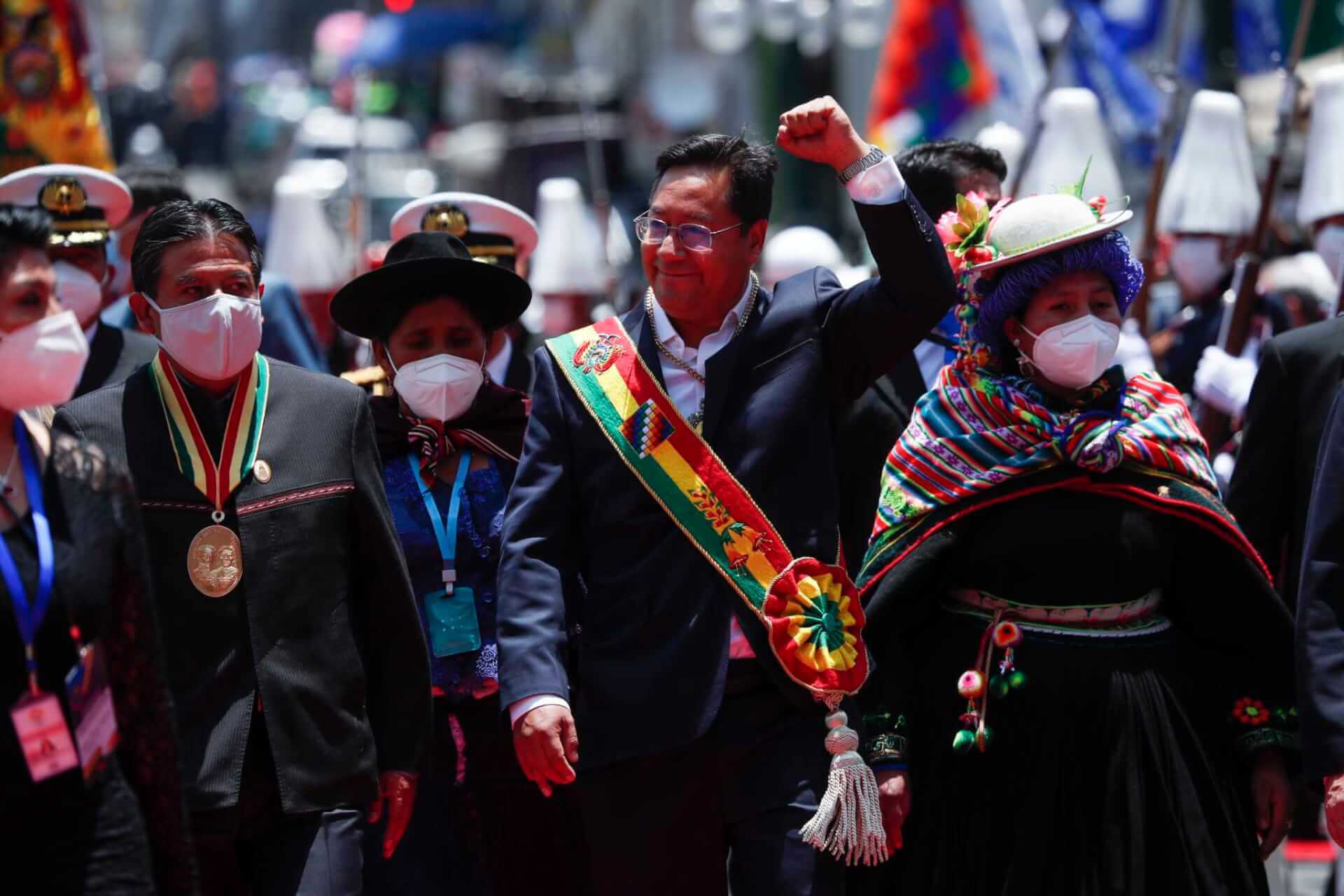Newly-elected Bolivian President Luis Arce was sworn into office on Sunday, ushering a new era in Bolivian politics. This follows a tumultuous past year, during which the now-former President Evo Morales was ousted by a US-backed coup and interim President Jeanine Añez withdrew from running for office.
Although Venezuelan President Nicolás Maduro was unable to attend as planned, his Foreign Minister Jorge Arreaza did join his Iranian and Uruguayan counterparts Javad Zarif and Francisco Bustillo in attending the inauguration ceremony. Also in attendance were Spain’s King Felipe VI, and the presidents of Paraguay, and Argentina.
During his speech, Arce said, “Our government will seek to rebuild our country in unity to live in peace,” and denounced the instability caused by the “brutal” Añez administration, whom he accused of undermining the country’s democracy and of “reversing” the “conquests of the Bolivian people”.
Accordingly, Arce pledged to “to rectify what was bad and deepen what was good”, while Vice President David Choquehuanca said that this period “signifies a new time to listen and heal wounds”. Together, they promised to work towards reducing unemployment, poverty, and inequality through “responsibility and inclusion”.
The ceremony was not without incident, however. The opposition party, Comunidad Ciudadana, which is headed by former president and recently defeated presidential candidate Carlos Mesa, voiced its objection to how bills on ‘procedural matters’—such as the promotion of military and police officers, and the designation of ambassadors—can now be passed via a simple majority. In the past, a two-thirds majority was required, and thus Mesa has accused the ruling government of “modifying the rules of the two chambers” and of restricting the influence of the opposition.
Meanwhile, former President Evo Morales returned to Bolivia on Monday following a period of self-enforced exile in Argentina, and was greeted by hundreds of supporters. He continues to face charges of treason and sedition; however, now that his party, the Movement Toward Socialism (MAS), is in power, the threat of prosecution has been significantly minimized. He told the crowd: “I had no doubt that I would return, but I did not imagine that it would be so soon—something so historic and so unprecedented.”
Morales declared, “With patience and without violence, we recovered our Homeland. We returned millions.” Like Arce, he, too, denounced the Añez administration, saying, “The coup plotters said that MAS could not return to the government nor Evo to Bolivia. Today the MAS is in the Government and Evo in Bolivia thanks to the Bolivian people.”
During the recently-concluded election, Arce garnered 52.4% of the votes against Mesa’s 31.5%. Meanwhile, the We Believe Alliances’ candidate, Luis Fernando Camacho, received 14.1% of the votes.
Arce’s popularity s derived from his tenure as former president Evo Morales’ economy minister, when he oversaw considerable growth and poverty reduction. However, he walks into a drastically different economy now, particularly in light of the coronavirus pandemic, which has reduced the prices of Bolivia’s mineral exports, decreased wages across the country, and sent many into unemployment.
Meanwhile, Morales led the nation from 2006 to 2019 and won three consecutive elections and ran for a fourth term in October 2019 prior to his resignation in November. This was in contravention of the three-term limit, a law that was reinforced by the fact that citizens voted against a constitutional amendment that would remove this limit in 2016.
Nevertheless, he contested the election, and was declared the winner. However, several irregularities prompted suggestions of vote-rigging, resulting in widespread protests, ultimately leading to his resignation on November 10 under military and public pressure.
In addition to existing charges such as terrorism, genocide, sedition, and corruption, in August, the justice ministry issued a complaint against Morales for statutory rape and human trafficking over an alleged relationship with a sixteen-year-old girl during his time in office.
After he stepped down, Senator Jeanine Áñez, leading a coalition of the Democrat Social Movement party and four other parties, assumed the interim presidency. During her time in office, she attempted to undo some of Morales’ leftist influence on the country’s policies and its foreign relations.
Following the interim right-wing presidency of Áñez, Bolivia now appears to be making another marked shift to the left. After MAS’ electoral victory, Morales publicly extended his gratitude to Mexico, Argentina, Venezuela, and Cuba. Arce himself has already stated that he will look to restore strong diplomatic ties with Venezuela, Cuba, and Iran, denouncing the ‘ideological’ shift under Áñez.
Following his win last month, Arce himself was quick to thank Venezuela’s Maduro for his congratulatory tweet on his “great victory”. In fact, it was no coincidence then that Arce invited both Maduro and Argentina’s Alberto Fernández to his inauguration ceremony. Likewise, during speech upon his return to Bolivia, Morales once again thanked Fernández and Maduro, as well as Cuba’s Miguel Diaz-Canel for their unwavering support.
Nevertheless, Arce has sought to downplay tensions with the US, by saying that “If they want to re-establish a relationship with us, the only thing we ask for is that we are respected as equals.” Similarly, following Joe Biden’s electoral victory, the Bolivian leader tweeted, “With a new government, we hope to improve relations that translate into the well-being of our people.”

